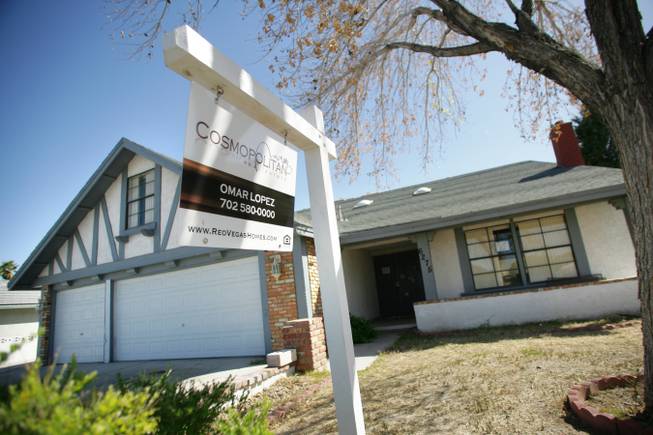
A foreclosed home is seen Thursday, April 28, 2011.
Wednesday, May 8, 2013 | 2:58 p.m.
A legislative subcommittee has approved a $149 million program to help thousands of Nevada homeowners who became delinquent on their loans from 2002 to 2008.
Assemblyman Paul Anderson, R-Las Vegas, said he was initially concerned this might be competing with the private sector. But after getting more information, he said: “I’m very confident they can build a successful program.”
The state Business and Industry Department will be working with private companies to fashion the details. The goal is to identify underwater properties with defaulted mortgage loans before foreclosure has started.
The Home Retention Program would buy the delinquent property at a discount and resell it to existing occupants at current fair market value, thus providing a mortgage loan the homeowner can afford.
The department estimates it will acquire 4,600 mortgages with a goal of keeping 50 percent of these individuals in their homes in the next seven years.
Business and Industry Department Director Bruce Breslow said there will be only a handful of state workers to oversee the program that will be run by a nonprofit corporation.
It will be financed by $49 million from a national mortgage settlement fund and $100 million from the U.S. Treasury Department. Breslow said his staff is working with the Treasury Department to set the guidelines for what homes will qualify.
Financial experts for the Senate-Assembly Budget Subcommittee gave an example: A home with a value of $417,000 in 2007 may be worth only $200,000 today. But the balance due is $376,395 with monthly payments of $2,425. Under the purchase plan, the home would be refinanced at $200,000 with a monthly payment of $1,200.
The nonprofit would take possession of the home, rehabilitate it and sell it to owners who intend to live in the property. The home would not be sold to investors.
The homeowner must demonstrate income that can meet the reduced payments. For those unable or unwilling to take part in the program, there could be money to provide a security deposit for rent and two months of rental assistance on a case-by-case basis.
Any unspent money at the end of the seven-year project would be returned to the state.
“This can really help our folks,” said Senate Majority Leader Mo Denis, D-Las Vegas.
But he and others suggested that the department report periodically to the Interim Finance Committee on its progress.

Join the Discussion:
Check this out for a full explanation of our conversion to the LiveFyre commenting system and instructions on how to sign up for an account.
Full comments policy